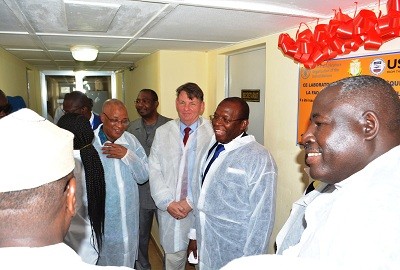Speeches Shim

Partnership in Practice
For the first time in fifteen years, Guinea now has a fully functional veterinary laboratory. On November 14, 2018, U.S. Ambassador Dennis Hankins and the Guinean Prime Minister Ibrahima Kassory Fofana officially inaugurated the U.S. Agency for International Development (USAID)-renovated Central Veterinary Diagnostics Laboratory (CVDL) in Conakry. The Food and Agriculture Organization (FAO) of the United Nations renovated the CVDL under a public international organization grant from USAID’s Global Health Bureau. The veterinary laboratory’s improved diagnostics capacity for zoonotic diseases strengthens Guinea’s disease surveillance systems. USAID funded this project under the Global Health Security Agenda (GHSA). GHSA has been active in Guinea since 2016 with USAID, the U.S. Centers for Disease Control and U.S. Department of Defense as key partners to the Government of Guinea.
With $635,000, the FAO fully rehabilitated and equipped the CVDL. This included reinforcing the technical capacities of the laboratory staff through various training opportunities in Guinea and abroad. The equipment purchased includes polymerase chain reaction (PCR) machines, an immuno-florescent microscope for rabies, biosafety and biosecurity cabinets, parasitology microscopes, and centrifuges. With renewed capacities and equipment, the CVDL is poised to detect zoonotic diseases much earlier, thereby providing adequate time for the animal health sector to respond to potential zoonotic disease outbreaks that can be passed to humans, including rabies, brucellosis, avian influenza, and anthrax (all of which are endemic to Guinea).
Putting the Lab through its Paces
The lab has been busy. Brucellosis is a priority zoonotic disease spread to humans by consuming infected meat and unpasteurized dairy products. The lab also identified three positive rabies cases out of six samples taken from dogs. This diagnostic capacity for rabies will provide a better understanding of the disease prevalence and will inform the associated measures needed to be put in place with the human health sector (e.g. health facilities) to avoid rabies-related deaths.
Towards Self-Reliance
In the coming year, USAID, through the FAO, plans to resurrect three regional laboratories, one each in Labé, Kankan, and Nzerekoré. USAID will also provide diagnostics training to the Veterinary School of Dalaba. These regional laboratories will serve as regional antennae, testing samples closer to the collection sites, thereby allowing for quicker results and quicker response. They will relay information and samples to the CVDL in the capital city for confirmatory testing. The Public Affairs Section (PAS) currently has an English Language Fellow at the Veterinary School of Dalaba, who instructs students and provides training for professors, however, he will likely move to Conakry in the very near future due to security concerns.
This project represents another successful activity supported by the USG in the post-Ebola response to strengthen Guinea’s prevention, detection, and response capabilities. This complements current active disease surveillance and reporting with quick confirmation of suspected disease outbreaks in-country. However, despite this new lab, the GOG needs to make domestic resources available through sustainable mechanisms for the newly renovated laboratory. Post continues to encourage the GOG to increase the Ministry of Livestock's budget in order to foster this self-reliance.

Comment
Make a general inquiry or suggest an improvement.